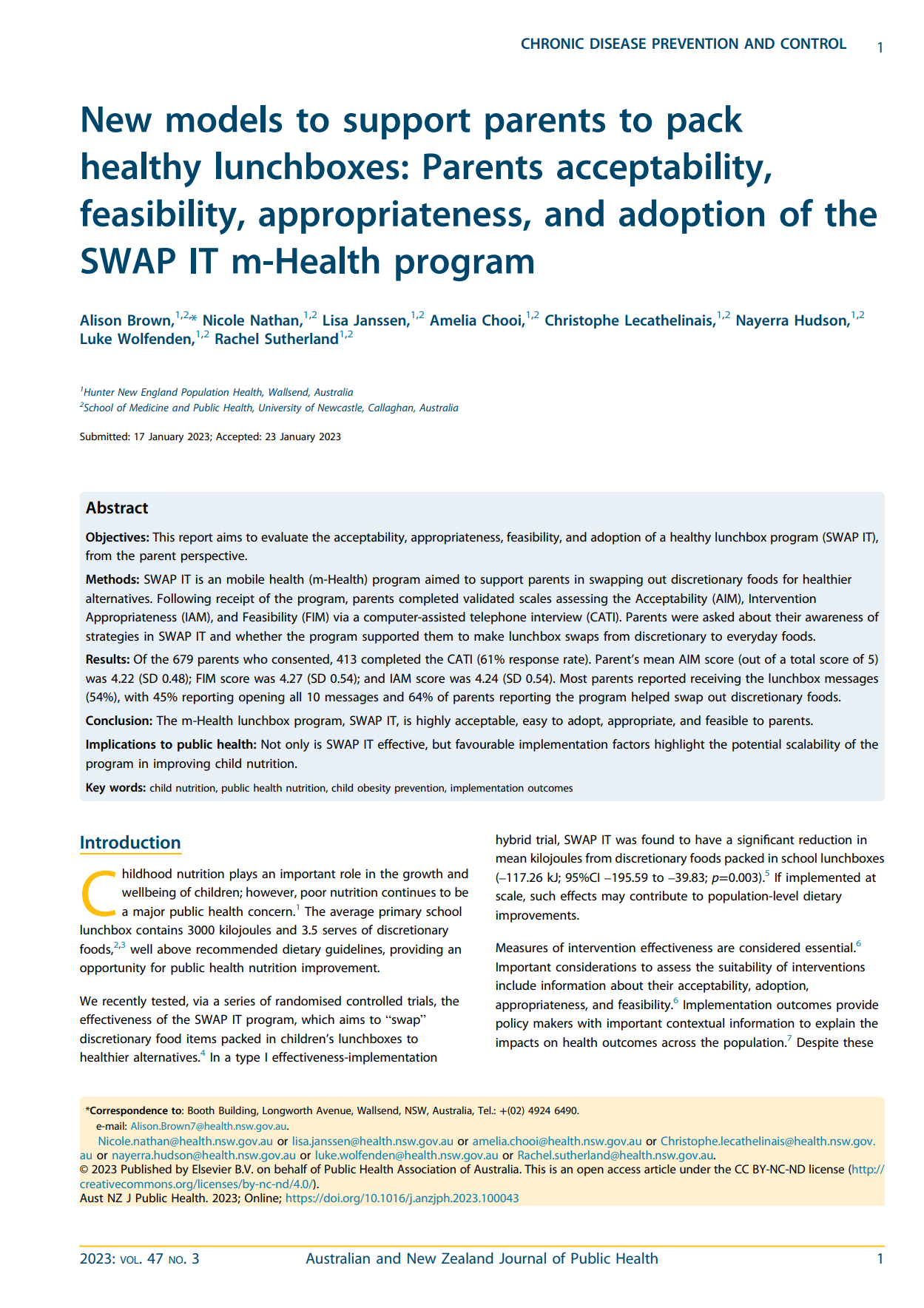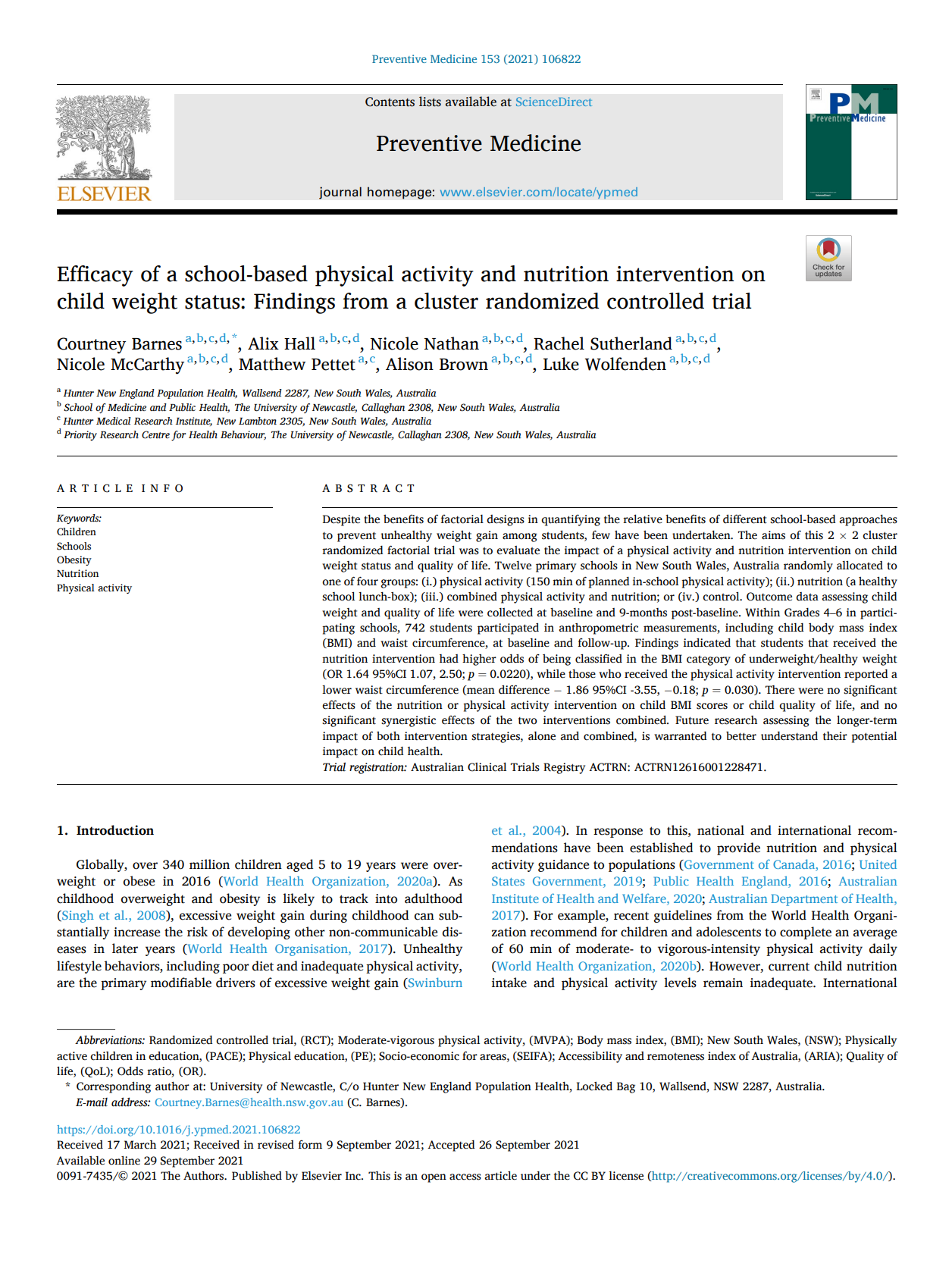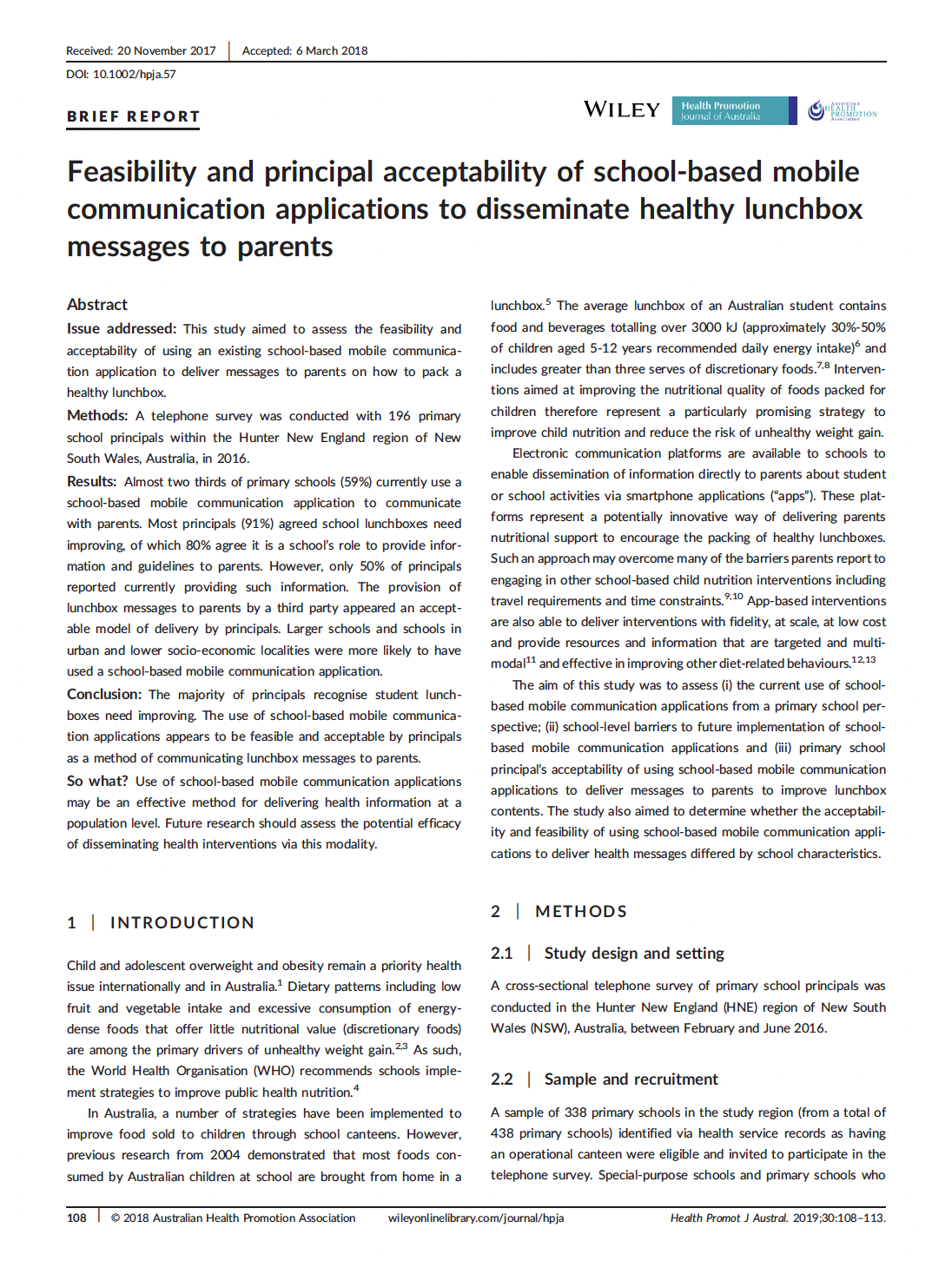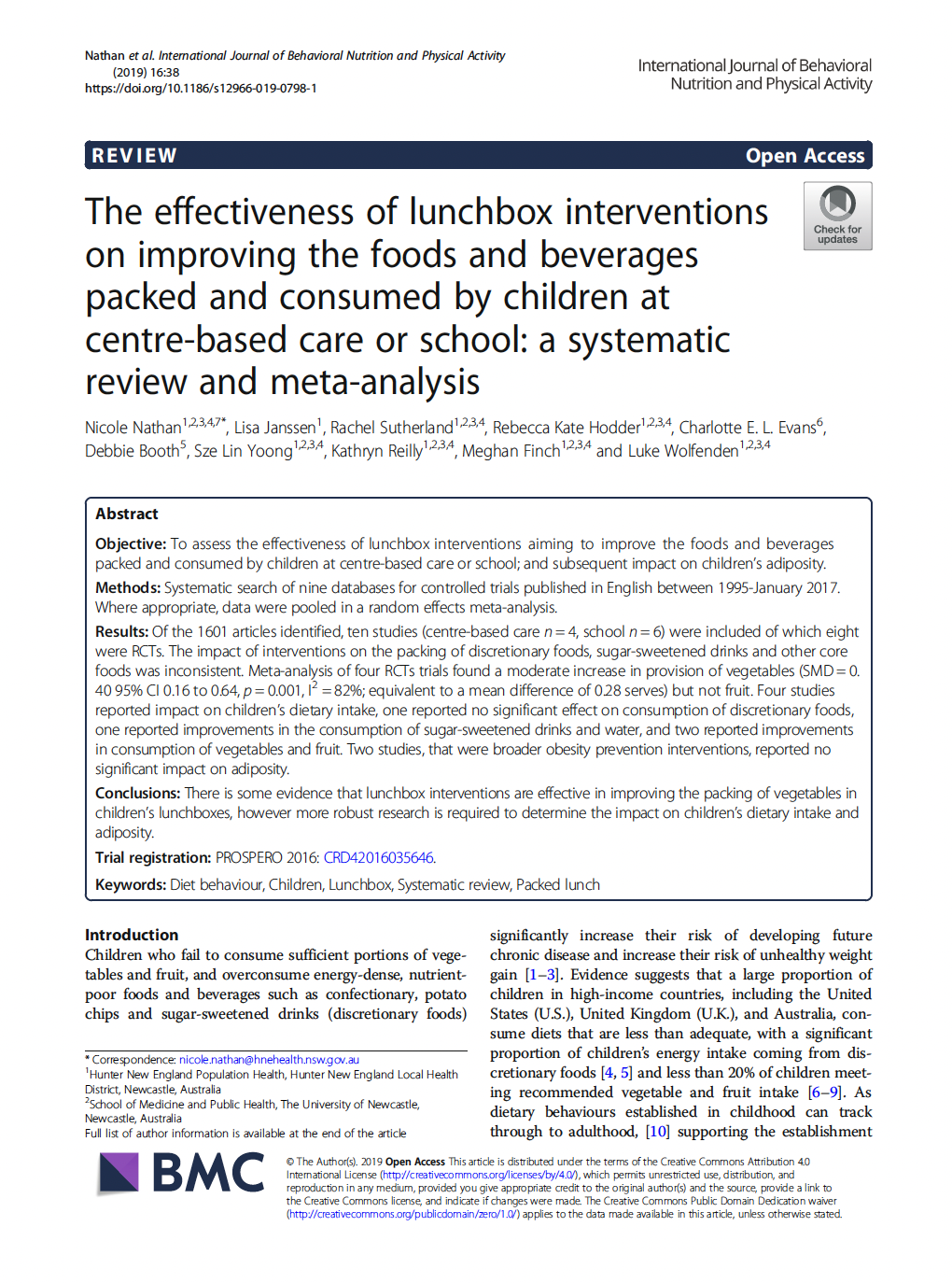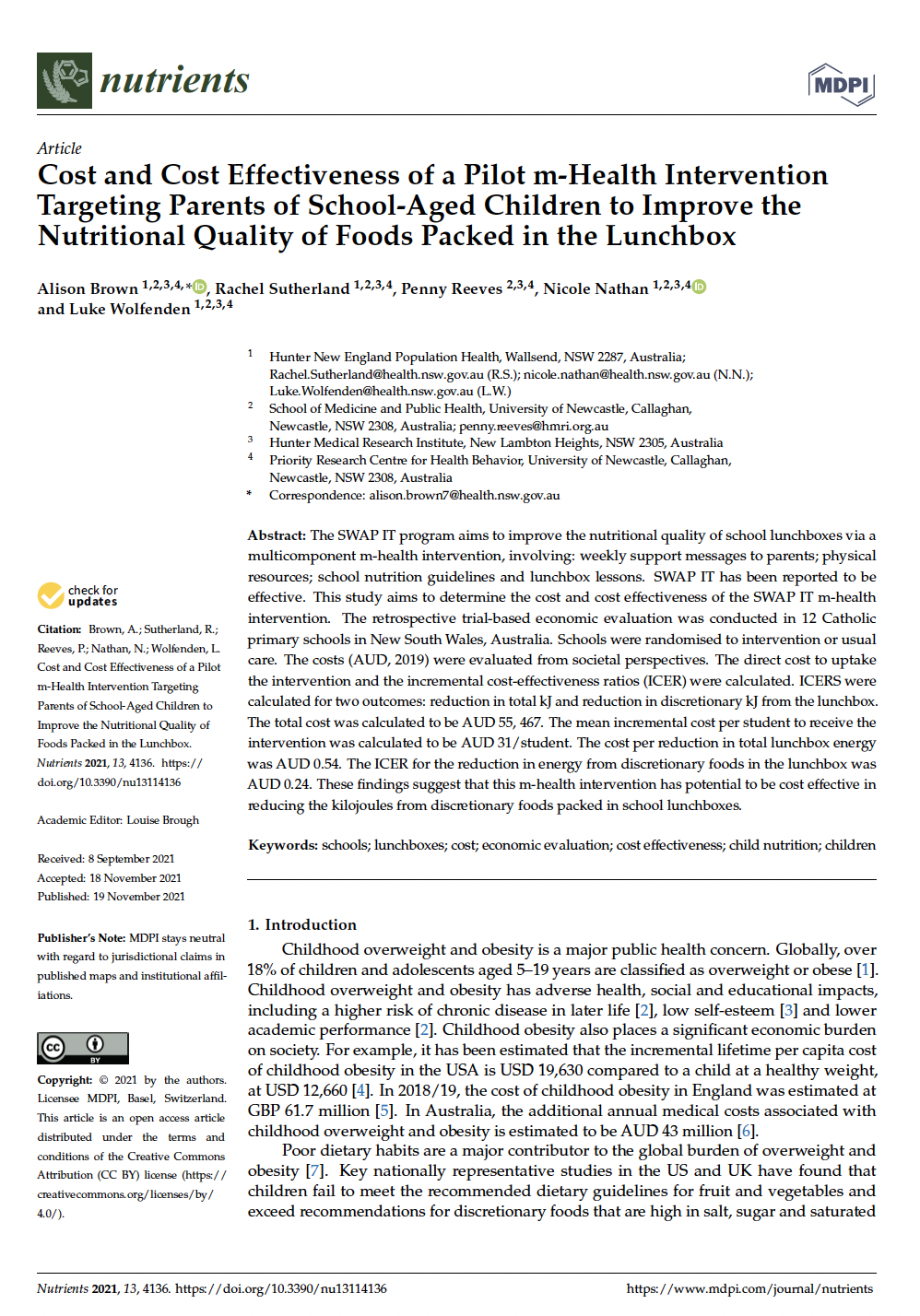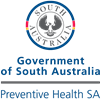Benefits of SWAP IT
Developed by researchers at the University of Newcastle, in conjunction with dietitians and health promotion experts, SWAP IT is an effective, low cost, evidence-based behavioural change program to improve children’s nutrition. SWAP IT supports parents and carers to improve children’s eating habits by ‘swapping out’ sometimes lunchbox foods for everyday alternatives.
SWAP IT Improves Children’s Nutrition
Research involving more than 40 Australian primary schools and over 6,000 children, found SWAP IT was effective in reducing the consumption of sometimes foods in children’s lunchboxes.

In schools who implemented SWAP IT, energy from sometimes foods decreased by an average of 117kJ per day (1). This equates to approximately 600 kilojoules per week, or the equivalent of one serve of sometimes foods, packed in children’s lunchboxes. Two thirds (66%) of parents and carers reported a change in their children’s eating habits following the introduction of SWAP IT at their school. The research proves SWAP IT is helping to reduce unhealthy foods in children’s lunchboxes and change eating habits.
The Impact of SWAP IT
The reduction of sometimes foods, as shown in the SWAP IT research trials, can lead to important benefits both individually and through the health system. Modelling has shown that by decreasing sometimes food consumption by 600 kilojoules a week, it can decrease the risk of obesity and type 2 diabetes, and save the healthcare system up to $1.35 million (a year) (2).
![]() SWAP IT improves children’s school day and overall nutritional intake(3, 4, 5, 6).
SWAP IT improves children’s school day and overall nutritional intake(3, 4, 5, 6).
![]() SWAP IT has been adopted by schools nationally:
SWAP IT has been adopted by schools nationally:
- SWAP IT has been adopted by >1200 primary schools nationally – supported by scale up by Health agencies (750) and disseminated by Audiri (450).
![]() SWAP IT research has been cited internationally:
SWAP IT research has been cited internationally:
Our research has been cited within 6 international policy document to improve childhood nutrition:
1. World Health Organisation:
- Assessing the existing evidence base on school food and nutrition policies: a scoping review: https://iris.who.int/bitstream/10665/341097/1/9789240025646-eng.pdf
- Nutrition action in schools: a review of evidence related to the nutrition-friendly schools initiative: https://iris.who.int/bitstream/10665/338781/1/9789241516969-eng.pdf
2. Canadian Agency for Drug and Technologies in Health
- Behavior-based Primary-Care Interventions for the Prevention of Overweight and Obesity in Children:https://www.cadth.ca/sites/default/files/pdf/htis/2021/RA1169%20Ped%20Obs%20Prev%20Behave%20Final.pdf
- Behavioral Interventions for Weight Loss in Children with Overweight or Obesity: https://cadth.ca/sites/default/files/rr/2021/RA1167%20Ped%20Obs%20Tx%20Behave%20Final.pdf
3. Food and Agriculture Organisation for the United Nations
- The effectiveness of policies and programmes promoting fruits and vegetables: http://www.fao.org/3/cb5725en/cb5725en.pdf
4. Royal Netherlands Academy of Arts and Sciences (KNAW)
- SAPEA report Towards Sustainable Food Consumption: https://zenodo.org/record/8031939/files/report%201.0.pdf?download=1
![]() We have used novel methods to advance scale up research:
We have used novel methods to advance scale up research:
- We are currently conducting research to evaluate effective scale up strategies involving ~2000 primary schools nationally across NSW(7,8) and nationally (9).
- Our Community of Practice supports Local Health Districts across NSW and Preventive Health agencies nationally to implement best practice scale up methods (10).
- Our collaborative approach is impacting health promotion practice (11).
Research on SWAP IT has shown:
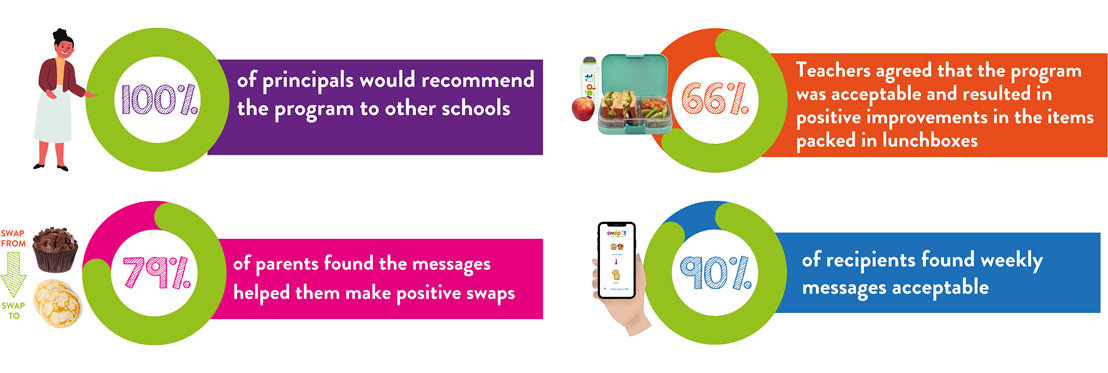
See Current Research on SWAP IT
Funding
The development, evaluation and research to identify effective methods to scale up SWAP IT has been supported by:
- 2018 NSW Ministry of Health Translation Research Grant Scheme – Round 3 (Application #69)
- Nib Foundation Multiyear Partnership Grant (2017-2020)
- 2021 NSW Ministry of Health Translation Research Grant Scheme – Round 6 (Application #9)
- MRFF Cardiovascular Mission (APP 2015952)
- Hunter Medical Research Institute - SWAP IT Cultural Evaluation
Awards
2023
- NSW Health Award (Research and Innovation): SWAP IT Healthy Lunchbox Program - Winner
- HNE Excellence Award Winner (Research and Innovation) Winner: SWAP IT Healthy Lunchbox Program
2021
- HNE High Value Healthcare Awards (Keeping People Healthy) finalist: SWAP-IT Healthy Lunchbox program- Winner
Audiri is a proud supporter of SWAP IT
|
"The success of SWAP IT lies in our adoption of evidence-based strategies from the University of Newcastle, ensuring schools can easily implement and benefit from the program. We have received great feedback from parents and schools alike about the program"
"We're thrilled to announce that via our dissemination through our Audiri app, we have delivered the SWAP IT healthy lunchbox program to help over 450 schools nationwide improve student dietary intake"
 Andrew Brodie, General Manager, Audiri Andrew Brodie, General Manager, Audiri |
SWAP IT Schools in NSW:
There are currently 812 primary schools that have adopted the SWAP IT healthy lunchbox program in NSW.
References
- Sutherland R, Brown A, Nathan N, Yoong S, Janssen L, Chooi A, et al. A Multicomponent mHealth-Based Intervention (SWAP IT) to Decrease the Consumption of Discretionary Foods Packed in School Lunchboxes: Type I Effectiveness–Implementation Hybrid Cluster Randomized Controlled Trial. J Med Internet Res. 2021;23(6):e25256.
- Ma Y, He FJ, Yin Y, Hashem KM, MacGregor GA. Gradual reduction of sugar in soft drinks without substitution as a strategy to reduce overweight, obesity, and type 2 diabetes: a modelling study. The lancet Diabetes & endocrinology. 2016;4(2):105-14.
- Sutherland R, Nathan N, Brown A, Yoong S, Finch M, Lecathelinais C, Reynolds R, ... Wolfenden L. A randomized controlled trial to assess the potential efficacy, feasibility and acceptability of an m-health intervention targeting parents of school aged children to improve the nutritional quality of foods packed in the lunchbox 'SWAP IT'. International Journal of Behavioural Nutrition and Physical Activity. 2019. 16(1): 54. doi.org/10.1186/s12966-019-0812-7
- Sutherland R, Brown A, Nathan N, Yoong S, Janssen L, Chooi A, et al. A Multicomponent mHealth-Based Intervention (SWAP IT) to Decrease the Consumption of Discretionary Foods Packed in School Lunchboxes: Type I Effectiveness–Implementation Hybrid Cluster Randomized Controlled Trial. J Med Internet Res. 2021;23(6):e25256.
- Sutherland R, Jones J Brown A, Barnes C, Janssen L, Nathan N, and Wolfenden L. Scaling up a healthy lunchbox program SWAP IT_which strategies are core and cost effective?. International Congress on Obesity. Melbourne Oct 20222
- Sutherland R, Jones J Brown A, Barnes C, Janssen L, Nathan N, and Wolfenden L.Can a school nutrition intervention have an impact on whole day total energy intake?. International Congress on Obesity. Melbourne Oct 20222.
- NSW Ministry of Health- Translation Research Grant Scheme. (Application ID: #9). A randomised controlled trial to evaluate the scale-up of a technology based healthy lunchbox initiative: a solution to address poor dietary intake. 2022
- Barnes, C. et al. (2024) ‘A collaborative network trial to evaluate the effectiveness of implementation strategies to maximize adoption of a school-based healthy lunchbox program: A study protocol’, Frontiers in Public Health, 12. doi:10.3389/fpubh.2024.1367017
- Medical Research Future Fund. Cardiovascular Mission (Application ID: 2015952). Using existing digital infrastructure for the national scale-up of an effective school nutrition program to reduce population CVD risk.
- Barnes, C., Sutherland, R., Jones, G., Kingon, N., NCOIS Research Collaborative, & Wolfenden, L. (2023). Development and piloting of a community of practice to support learning and improvement in health promotion practice within NSW Local Health Districts. Public Health Research & Practice, 33(3). https://doi.org/10.17061/phrp3332326
- Sutherland R et al. Enhancing the implementation of evidence based scale up methods within NSW Prevention Agencies. Process evaluation of the scale up of SWAP IT across 13 Local Health Districts in NSW (Mixed Methods research - unpublished data)





